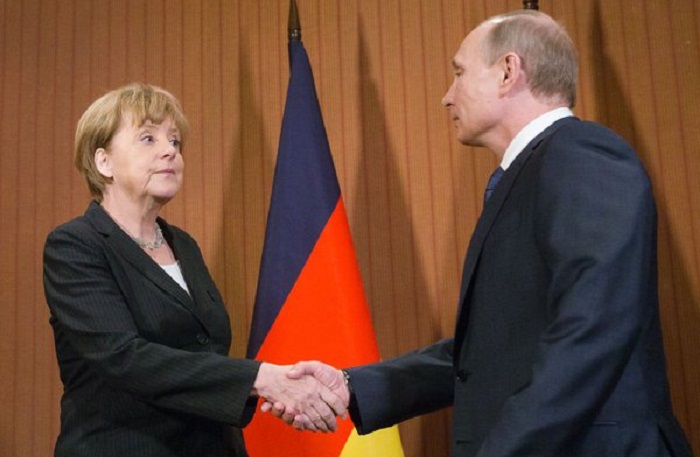Russia, Germany agree diplomacy key to peace in Ukraine

Addressing a joint press conference with German Chancellor Angela Merkel in Moscow, Putin said: "Yes, it is true that we (Russia and Germany) differ considerably in our assessment of the events that led to the anti-constitutional coup in the Ukrainian capital in February 2014.
“But at the same time, I am sure that you will all agree, and the participants in the peace talks say this constantly, that there is no alternative to a peaceful diplomatic solution. To achieve this, we must fully and strictly abide by the Minsk agreements reached on Feb. 12 this year."
Putin noted that the Minsk process was making progress despite difficulties, and said he firmly believed that "the only way to guarantee a reliable and lasting settlement is to organize a direct dialogue between Kiev, Donetsk and Lugansk."
The Russian president said that it was essential to lift the economic embargo on the Donbass region, restore financial and banking ties; and carry out constitutional reform with the southeastern regions’ involvement.
Putin also said that the latest meeting of the Contact Group on Ukraine concluded with the establishment of four sub-groups to address specific areas of the settlement process, adding that the sub-groups began their work in Minsk on May 6.
"We will do everything possible to make their work effective, though success here depends above all on the authorities in Kiev.
"We will exert all possible influence on the authorities in Donetsk and Lugansk in order to ensure that this process goes at the hoped for speed and quality," he said.
The Trilateral Contact Group of representatives from Ukraine, Russia, and the Organization for Security and Co-operation in Europe, or the OSCE was formed after the May 2014 election of Ukraine President Petro Poroshenko with an intent to facilitate dialogue between Kiev and Moscow towards finding a diplomatic resolution to the crisis in eastern Ukraine.
- ‘Both sides breach cease-fire’
Merkel for her part said that the Minsk agreement was essential in solving the Ukraine crisis, and that both Kiev and pro-Russian separatists were responsible for the violation of the cease-fire agreement in eastern Ukraine.
"It is not possible to say that one side adheres to the deal 100 percent, and the other side does not. Cease-fire breaches are observed on both sides," Merkel said, citing the daily reports submitted by the OSCE.
Merkel stressed that Ukraine`s territorial integrity had to be maintained, and said: "We cannot say that the Minsk deal is successful. But we have no other alternative. Therefore, we must continue to work with it."
The Feb. 12 Minsk cease-fire agreement includes the withdrawal of heavy weaponry from combat areas, and of all foreign-armed formations; release of all hostages and unlawfully detained persons as well as political reforms and decentralization in the eastern Ukrainian regions.
However, the agreement has failed to be implemented fully, with daily reports of breaches.
More than 6,000 people have lost their lives in the conflict between Ukrainian forces and pro-Russian separatists since April 2014, according to the UN.















































